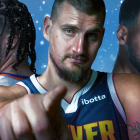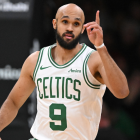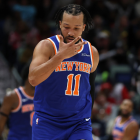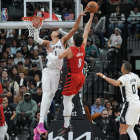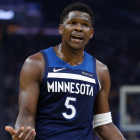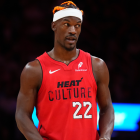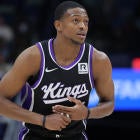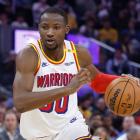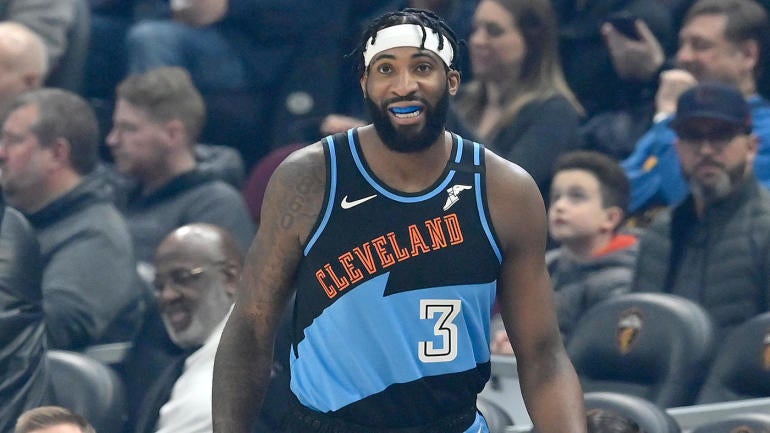
Andre Drummond is a valuable basketball player. It's a somewhat obvious sentiment considering his former All-Star status, max contract, league-leading rebounding numbers and career-high scoring average, but it's something that needs to be established before the rumor mill suggests otherwise. The Cleveland Cavaliers traded for Andre Drummond because they believed he was a valuable basketball player. They are winning, in part, because he is a valuable basketball player. And generally, valuable basketball players are not available for free.
Yet the sharks have been circling on Drummond from the moment his team acquired Jarrett Allen from the Brooklyn Nets. Drummond, on an expiring contract, is now competing for a place in Cleveland's long-term plans with Allen, whose contract also expires this offseason. If he loses, and the Cavaliers are unable to move his large salary in a deadline trade, there is a line of thought suggesting that Cleveland would be best-served buying out Drummond's contract in order to free up minutes for Allen and save a bit of cash rather than allowing him to walk in the offseason. Drummond has become the apple of Brooklyn's eye ever since it lost Allen, its best rebounder and interior defender, with The Ringer's Kevin O'Connor reporting their interest in an interview with New York mayoral candidate Andrew Yang. Other teams are surely waiting in line for the chance to snag him.

CBS Sports HQ Newsletter
Your Ultimate Guide to Every Day in Sports
We bring sports news that matters to your inbox, to help you stay informed and get a winning edge.
Thanks for signing up!
Keep an eye on your inbox.
Sorry!
There was an error processing your subscription.
But as O'Connor mentioned, a buyout is unlikely. That is the polite way of saying that it isn't going to happen. Unless Drummond is hellbent on competing for a championship or Cleveland is similarly devoted to tanking, neither side has much incentive to mutually part ways this season. Yet rumors to the contrary won't go away. So in the interest of grounding the buyout market in some form of reality, let's dive into the mechanics of such transactions to show why it is that Drummond won't get be getting one.
Who typically gets bought out
There are exceptions to every rule, but the buyout market under normal conditions tends to be dominated by players from one of two groups.
- Aging veterans on expiring contracts that play for bad teams.
- Aging veterans who have been traded at the deadline as salary filler to teams that don't want to keep them.
Again, there are occasionally exceptions, but these are generally the kinds of players that are available. Just think of the biggest names on last season's buyout market.
- Markieff Morris and Reggie Jackson both received buyouts from the Pistons. Morris was 30 at the time, and Jackson was two months away from his 30th birthday. Both were on expiring contracts.
- Marvin Williams received a buyout from the Charlotte Hornets. He was 33 years old on an expiring contract.
- Anthony Tolliver received a buyout from the Sacramento Kings after getting traded there by Portland. He was 34 and on an expiring contract.
It's a mutually beneficial arrangement. Teams get to save a bit of cash on players they don't intend to keep and open up minutes for their younger players (while appeasing a few agents in the process). Players get to chase a ring or showcase their value in a better situation.
DeMarre Carroll received the rare multi-year buyout, and Jeff Green was a valuable in-season addition that was waived by a good team (Utah), but generally, the trend holds. Older rotation players on bad teams tend to get buyouts. Younger starters tend not to. The biggest name on the buyout radar last season was Tristan Thompson, another Cleveland big man in his 20s. Those rumors intensified after the Drummond deal but never came to fruition. Why not?
Why wouldn't Drummond want a buyout?
Thompson didn't seek a buyout from the Cavaliers because he didn't want to take re-signing in Cleveland off of the table. When a player is bought out of an existing contract, his Bird Rights disappear. This isn't a problem for older players likely to make the minimum for the remainder of their careers. It is a serious issue for younger players still hoping to cash in. Thompson looked ahead and saw an offseason with very little available cap space and a glut of players at his position trying to get it. Bird Rights offer a form of theoretical sanctuary. A player with full Bird Rights can re-sign with his original team for any amount up to the max. If no other team were to make Thompson a satisfactory offer, he could have attempted to work out a fair deal with the Cavs knowing they weren't bound by the same market limitations as others.
Without Bird Rights, free agents are limited only to teams with cap space or cap exceptions. Thompson happened to take the mid-level exception from Boston. Drummond's ambitions are likely a good deal higher. He is making nearly $29 million this season. Dropping back down to seven figures probably isn't his first choice, especially at the theoretical peak of his earning powers. Drummond is still only 27 years old. Whether he deserves it or not, Drummond likely expects another substantial contract. If the mid-level exception isn't enough, he has only three other ways of getting it. A buyout eliminates two of them.
- The one method a buyout does not compromise is merely signing into a team's cap space. According to Spotrac, 14 teams are currently projected to have more practical cap space than the mid-level exception offers. Drummond, as arguably the top center on the market, might be able to convince one of those teams to give him the contract he wants, but finding a suitor isn't easy. Miami, Dallas, Memphis, Houston, New Orleans and Atlanta have all recently signed centers to expensive deals. Oklahoma City acquired one through trade. New York, Chicago and San Antonio have young centers they likely view as long-term starters. Aside from Cleveland, that leaves three openings: Charlotte, Sacramento and Toronto. The Raptors are unlikely. They preserved their space to hunt for stars. Sacramento and Charlotte are both possibilities, but the Hornets pursued Montrezl Harrell in December and may prefer to take another crack at him if he opts out of his deal with the Lakers. Both are candidates to pick the draft's top center, Evan Mobley. They are also both candidates to try to poach Allen from Cleveland, or to trade for a center in-season. This can't be ruled out, but it isn't an easy or reliable path. Just look at Hassan Whiteside. His per-36 minutes last year were nearly identical to Drummond's, but he got left standing when the music stopped and is now playing for the minimum.
- The second method is one we've already addressed: re-signing with Cleveland. It's not likely, but it should be noted that the Cavs are starting Drummond over Allen. For the time being, they seem to believe he is the better player. If the Cavs buy him out, they could pursue him with cap space, but re-signing a player with Bird Rights affords more flexibility.
- The third method is a sign-and-trade, a possibility that is also lost after a buyout as it disappears with his Bird Rights. While not every team can legally acquire a player through a sign-and-trade (doing so triggers a hard cap at the apron that a few teams can't afford), most of the 16 non-cap space teams become possibilities if Cleveland is willing to negotiate a sign-and-trade arrangement. By limiting himself to only cap space teams, Drummond would be cutting off around half of his possible suitors.
The word "almost" is in the headline of this story because players don't always act in their own self-interest, and their priorities may be different than we expect. Perhaps Drummond wants a ring so badly he'd make an ill-advised financial decision to pursue one. Perhaps he and his agent believe that playing for a contender would juice his value so much that sacrificing his Bird Rights is worthwhile. These possibilities can't be dismissed out of hand, but they shouldn't be viewed as realistic, either. Drummond is a 27-year-old former All-Star, and generally, such players make career decisions designed to maximize their earnings. Taking a buyout would limit those earnings.
And even if Drummond wanted to do so, it takes two to tango here. Cleveland would have to buy into a buyout, and right now, the Cavaliers just don't have much of a reason to do so.
Why wouldn't the Cavaliers want to give Drummond a buyout?
Let's circle back to the two primary reasons teams agree to buyouts and look at how they apply to Drummond.
- They save teams money. Cleveland, in all likelihood, would save around $5.7 million by buying out Drummond if his plan was indeed to go to Brooklyn. That's because Drummond would know the Nets could give him that much through the Disabled Player Exception granted following Spencer Dinwiddie's torn ACL. Now, $5.7 million isn't nothing, especially during a pandemic, but that's not enough to sway Dan Gilbert on a basketball decision. Few owners in all of sports are as comfortable spending as he is. The Cavs paid $136.5 million in luxury tax bills during the second LeBron James era. Gilbert lavishly spends on amenities at Cleveland's state of the art practice facility. A penny-pinching owner might push for a buyout. Gilbert's history suggests he won't. After all, he chose not to buy out Thompson last season.
- They open up minutes for younger players. This might be a problem for normal teams, but the Cavaliers routinely play multiple centers together. The combination of Drummond and Allen has already played 19 minutes together. Drummond and JaVale McGee have spent 36 minutes together, and Allen is averaging 25 minutes per game in Cleveland already, roughly in line with his Brooklyn averages. If they want to play him more, a trade or buyout of the 33-year-old McGee (who averages 16.5 minutes per game) makes more sense.
And then, of course, there's the type of team that usually buys out its players. Cleveland was expected to be a cellar-dweller entering the season, but through over a month, it's become apparent that the Cavaliers are, at the very least, a competitive team. They are currently ranked No. 8 on defense, and while their offense has struggled as a whole, it has been closer to average with Darius Garland on the floor, and should therefore improve now that he has returned. Cleveland has a .500 record and occupies the No. 6 seed in the Eastern Conference. That isn't the kind of team that usually gives players away for free. Some regression is feasible, but nothing about Cleveland's season so far suggests that it is going to tank.
But even if Cleveland lost its next 30 games, buying out Drummond would carry the same drawbacks for the organization that it would for him. Obviously, they would like to at least have the option to re-sign him should Allen receive an offer they aren't willing to match, but the more pressing matter is the possibility of a sign-and-trade. Buying out Drummond would grant Cleveland nothing but cash. A sign-and-trade would offer tools for on-court improvement.
Those tools don't even need to be tangible. Even if Drummond agreed to join a team with enough cap space to sign him outright, Cleveland could offer that team a draft pick to structure the deal as a sign-and-trade. Doing so would grant the Cavaliers a trade exception worth Drummond's new salary. They could then turn around and use that exception to acquire a similar player without having to send out any salary filler. This is the path Boston took when it lost Gordon Hayward. Yes, the Hornets could have signed him outright, but the Celtics gave them a second-round pick and now have a $27 million exception to wield in negotiations.
Cleveland wouldn't have to use such an exception, but having one is a powerful tool in the team-building process. That is especially true for a Cavaliers organization that is surprisingly capped out. While Cleveland will have space this offseason, that space will evaporate once a new deal for Allen and an extension for Collin Sexton kick in. Without high draft picks to continue the rebuilding process, that trade chip could be their best chance at adding another meaningful piece should Drummond join the right team. Should he be more interested in a team without space, Cleveland could negotiate appropriate compensation from there. Either way, there is no universe in which Cleveland actually needs to risk losing Drummond for nothing in free agency. The only path that guarantees that the Cavs don't get anything in return is the one in which they buy him out.
That is why a buyout almost certainly isn't coming. It would limit Drummond's options in free agency and deprive the Cavaliers of the opportunity to maximize him both this season and beyond. There's still a good chance he leaves Cleveland this summer, especially if the front office determines that Allen is the long-term starter, but not all departures are created equal. Some are more beneficial to all parties than others, and in this instance, a buyout helps nobody except for the contender stealing a former All-Star for pennies on the dollar.










